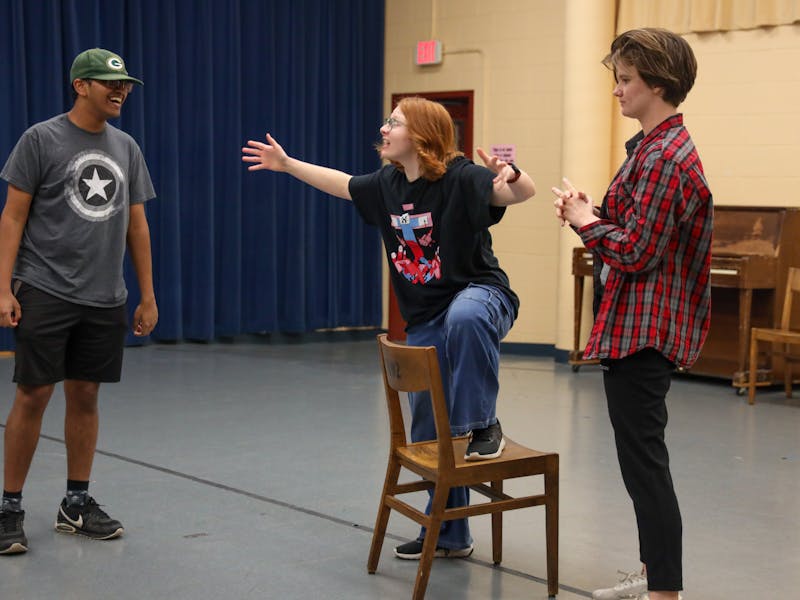Disclaimer: This article contains some spoilers.
“Movies that are dystopian-themed aren’t as good as they used to be,” stated Emily Marlow, a sophomore at USC.
The 2010s marked the golden age of the young adult dystopian genre with the releases of "The Hunger Games," "Catching Fire," and "Mockingjay." These books captivated audiences in a way that was reminiscent of "Twilight," which had revolutionized the romance genre earlier in the 2000s. "The Hunger Games" and "The Maze Runner" series arrived at the perfect time for Gen Z, during a cultural shift that embraced novel-adapted franchises.
During an era when book-to-movie adaptations dominated pop culture, "The Hunger Games" followed the success of "Harry Potter" and "Twilight" to become the next obsession for readers and moviegoers alike. Despite starting as a small-budget indie film, the first "Hunger Games" movie shattered box office records and set high standards for the genre.
But why did "The Hunger Games" strike such a deep chord with audiences at that specific time?
According to the Los Angeles Times, the 2010s weren’t just a golden age for dystopian novels—they were also a decade of massive protests.
Kirsten Yarborough, a junior at USC, pointed out the genre’s real-world parallels. “Everything I love about dystopian stories comes from their connection to real-life events," she stated. "(Yarborough 5:50) The genre peaked in the 2010s because its themes of rebellion against oppressive governments gave people hope.”
“The people of District 12 riot against the Capitol and the Peacekeepers attack them—you can see similar clips on Twitter from protests and riots around the world,” Yarborough said, referencing a particularly poignant scene.
If dystopian media once resonated so strongly, why hasn’t the genre maintained its momentum? Why aren’t there more hits on the level of "The Hunger Games" today?
The answer lies in the industry’s failure to innovate. Writers and studios attempted to replicate "The Hunger Games" formula without understanding that its success came from its originality. Suddenly, every new dystopian story featured the same tired tropes: oppressive governments, love triangles, a reluctant “chosen one” and a climactic rebellion.
“It’s a very unique genre that is hard to replicate,” Marlow said.
"The Maze Runner" offered a somewhat fresh take, with a unique and thrilling rebellion and a new combination of characters straying away from the tropes popularized by "The Hunger Games." However, the "Divergent" series marked the beginning of the genre’s decline.
At first, "Divergent" rode the dystopian wave successfully. Despite controversies surrounding its plot, with sources such as Vox going as far as quoting the protagonist as a "poor copy of 'The Hunger Games' Katniss," it developed a dedicated fan base. However, when the final book’s ending angered readers—its protagonist dying in a way that felt unsatisfying—the franchise crumbled. The planned fourth film was scrapped, and the genre’s mainstream appeal began to fade.
In the aftermath, numerous dystopian films attempted to recapture the genre’s former glory, but none succeeded.
A recent example is Netflix’s adaptation of "The Uglies." Instead of reinvigorating the genre, it joined the growing list of dystopian disappointments. Writers refused to break away from "The Hunger Games" blueprint: oppressive regimes, rebellion and romance. But in "The Uglies," the romance dominated the story, diluting the impact of the dystopian themes.
“[They] just jumped from topic to topic,” Marlow stated. The film barely scratched the surface of its most compelling idea—why a society would obsess over beauty and perfection. Instead, it offered a shallow exploration of the topic, resulting in a movie with the emotional depth of sand.
Another reason for the genre’s decline is shifting public sentiment. In the 2010s, dystopian narratives provided a lens for societal fears and injustices, offering a form of catharsis. However, in today's world—where real crises dominate daily life—audiences may feel exhausted rather than entertained by fictionalized oppression.
Yarborough reaffirmed public sentiment towards the dystopian genre in the current world. "A lot of people use literature as an escape," she said. "So the fall of dystopian novels really came from the fact that we started living something much more similar and that the content of books is geared towards a more escapism route."
Still, there is hope for dystopian media. Suzanne Collins, the genre’s reigning queen, made a triumphant return in 2020 with "The Ballad of Songbirds and Snakes," a prequel of "The Hunger Games" exploring President Snow’s origins. Its 2023 film adaptation was profitable at the box office even though it didn't garner the success of its predecessors, proving that audiences still crave well-crafted dystopian stories—as long as they bring something new to the table.
Marlow believes that the next wave of dystopian media will need to evolve. “There will be a new wave of dystopian novels more focused on diversity,” she said. She went on to mention the novel "Never Let Me Go," written by Japanese author Kazuo Ishiguro. The novel featured a deeply chilling society in which people are cloned only to harvest their lungs. Novels such as these, focusing on relevant themes and featuring diverse perspectives, may be the next step.
Rather than feature films, dystopian storytelling may also find a new home on television. Shows like "Squid Game" and "Black Mirror" have introduced fresh, thought-provoking takes on dystopian themes, proving that innovation is still possible. The real challenge for future writers and filmmakers is to break free from overused tropes and explore the vast potential of the genre in new and exciting ways.



